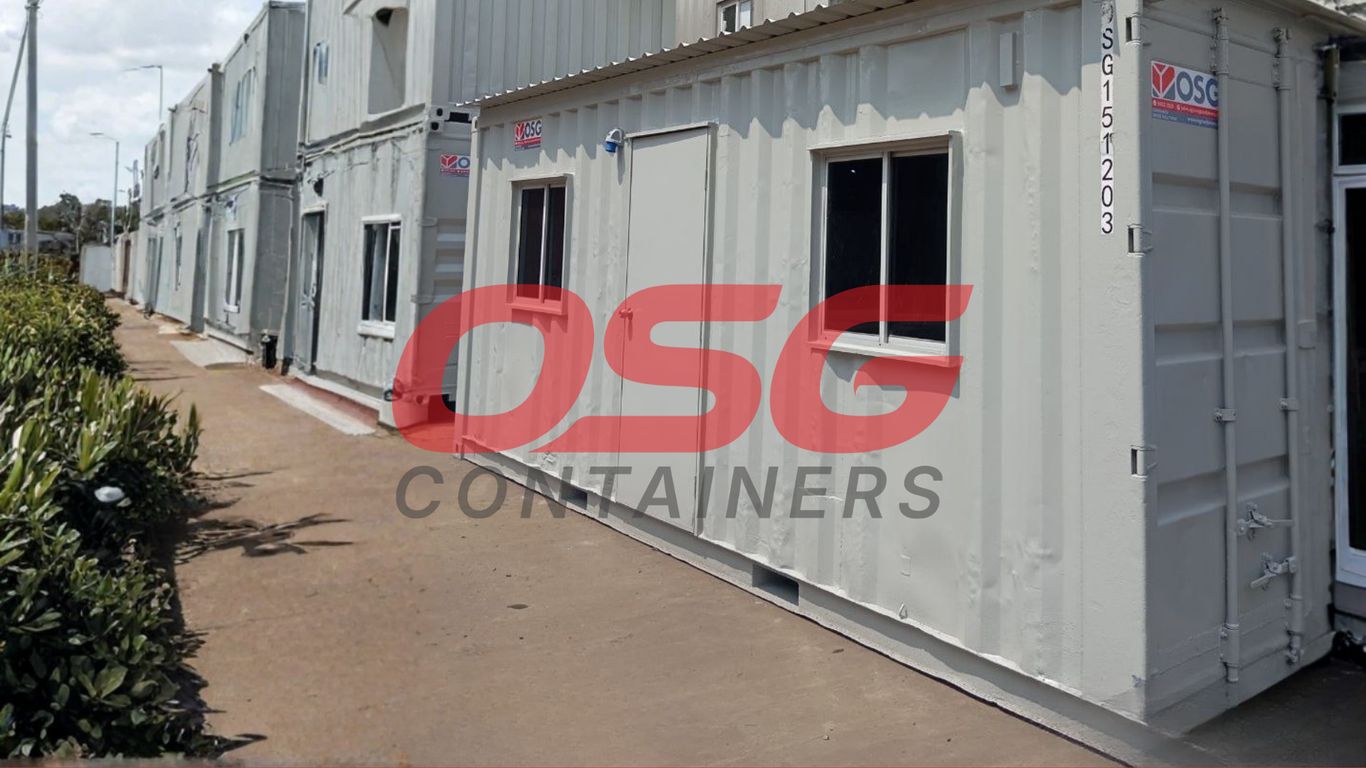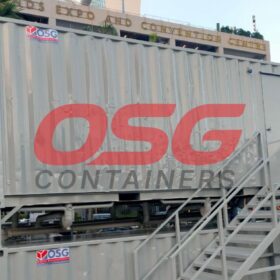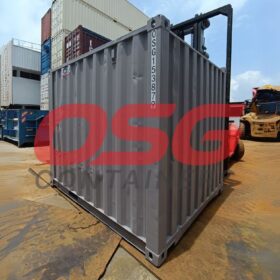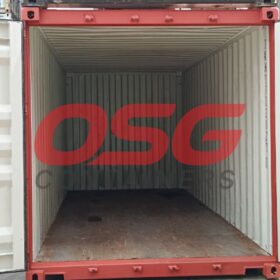Need some extra space, but not sure where to put it? Or maybe you need a temporary office on a job site? Renting containers can be a really practical answer for a lot of situations. They’re tougher than you might think and can be used for more than just storing stuff. Let’s talk about how renting containers works and why it might be just what you’re looking for.
Key Takeaways
- Renting containers gives you different sizes to pick from, fitting whatever you need to store or use as an office.
- You can rent them for short periods or much longer, making it super flexible for your project timeline.
- These containers are built tough, keeping your things safe from weather and theft, and they can be moved pretty easily.
- You can even get containers modified with things like shelves or air conditioning for a more comfortable workspace.
- Getting a container delivered is straightforward, but always check local rules about having one on your property.
Understanding Your Container Rental Options
When you’re looking into renting a container, it’s good to know what’s out there. You’ve got a few main things to think about, and they all play a part in getting the right fit for whatever you need.
Diverse Container Sizes Available
Containers aren’t one-size-fits-all, thankfully. You can usually find them in a few standard lengths. The most common ones you’ll see are 10-foot, 20-foot, and 40-foot. Think about what you need to store or what kind of space you need. A 10-foot might be just right for some tools and equipment on a small job site, while a 40-foot is a whole lot more room, good for bigger projects or storing a lot of inventory. It really just depends on the scale of your needs.
Flexible Rental Durations
Nobody likes being locked into something they don’t need. That’s why container rentals are usually pretty flexible. You can rent them for a short time, maybe just a few weeks for a specific project, or for much longer, like months or even years if you’ve got a long-term storage requirement. Most places work on an open lease, meaning you keep it as long as you need it, and they just keep billing you periodically. If your needs change, you can usually extend or shorten the rental period with a quick call.
Condition and Quality of Rental Units
When you rent a container, you want it to be in decent shape, right? Most rental companies keep their fleets pretty up-to-date. They’ll usually tell you that the containers are relatively new, and they get checked out and cleaned before they go out to you. This means they should be sturdy, dry, and ready to protect whatever you put inside. They’re built tough, usually from steel, and designed to keep the weather out.
It’s always a good idea to ask about the specific condition of the unit you’re looking at, especially if you have particular concerns about its appearance or any modifications.
Here’s a quick look at what you might expect:
- Size Options: 10′, 20′, 40′ are typical.
- Rental Terms: Short-term (weeks) to long-term (years).
- Unit Condition: Generally newer, inspected, and cleaned units.
- Material: Heavy-duty steel construction.
Benefits of Renting Containers for Your Project
Renting a container for your project might seem straightforward, but the advantages it brings can really make a difference, especially when you need a temporary setup. Think about it: you’ve got a job to do, a deadline to meet, and you don’t want to get bogged down with building permanent structures or dealing with complicated logistics. That’s where these containers shine.
Secure and Economical Temporary Solutions
One of the biggest draws is how secure and budget-friendly these containers are. They’re built tough, usually from heavy-duty steel, and come with sturdy locking mechanisms. This means your tools, materials, or even sensitive documents are kept safe from theft and the elements. Compared to renting traditional storage units or building temporary sheds, container rentals often come with lower upfront costs and predictable monthly payments. It’s a smart way to manage expenses without sacrificing security.
Portability and On-Site Convenience
Need to move your office or storage unit from one part of the job site to another? No problem. Containers are designed to be moved. They can be lifted by cranes or forklifts and transported easily. This flexibility is a huge plus on large construction sites or when projects shift locations. You can have your workspace or storage right where you need it, when you need it, saving you time and hassle.
Weatherproof Protection for Contents
Projects can run into all sorts of weather. Rain, snow, intense sun – your stuff needs protection. Rental containers are built to be weatherproof. They’re sealed tight to keep moisture out and are insulated to help regulate temperature. This means your equipment, inventory, or temporary office setup stays dry and protected, no matter what the weather is doing outside. It’s like having a mini, mobile warehouse or office that can handle the elements.
When you’re working on a project, especially one that’s time-sensitive or involves valuable equipment, having a reliable and secure place to store things or set up a temporary workspace is really important. Renting a container takes a lot of that worry away. You get a solid, protected space without the commitment or cost of building something permanent.
Here are some key advantages:
- Cost-Effectiveness: Avoids the high costs associated with building temporary structures or long-term leases.
- Security: Heavy-duty steel construction and lockable doors deter theft and vandalism.
- Flexibility: Easily relocate the container as your project needs change or move between job sites.
- Durability: Built to withstand harsh weather conditions, protecting your stored items.
- Quick Deployment: Can be delivered and ready for use much faster than traditional construction.
Customizing Your Rental Container
So, you’ve got a container on the way, but a plain steel box isn’t quite cutting it for your needs? No worries, that’s where customization comes in. Think of it like getting a plain t-shirt and then adding your own patches and designs – you can do the same with these containers.
Modified Containers for Specific Needs
Sometimes, a standard container just won’t do. Maybe you need a place to work, or perhaps you’re setting up a temporary shop. Companies can modify containers to fit all sorts of jobs. We’re talking about adding things like:
- Shelving: Great for organizing tools, inventory, or supplies.
- HVAC Systems: Keep things cool in the summer and warm in the winter, making it a comfortable workspace.
- Electrical Panels: Power up your equipment or lights.
- Toilets: For remote sites where facilities are scarce.
- Different Doors: Need a roll-up door for easy access to equipment? Or maybe a standard personnel door?
They can even do structural modifications, like cutting out entire walls for open-air setups. Imagine a container turned into a cool outdoor seating area or a ticket booth with a serving window. It really opens up the possibilities.
Essential Amenities for Workspace Comfort
If you’re planning to use your container as a temporary office or a break room on a job site, comfort is key. Nobody wants to work in a stuffy, dark box all day. Here are some things that make a big difference:
- Insulation: Keeps the temperature more stable, so your AC or heater doesn’t have to work overtime.
- Lighting: Good lighting makes a space feel more welcoming and productive.
- Air Conditioning/Heating: Absolutely necessary for year-round use.
- Basic Furniture: Desks and chairs can turn an empty shell into a functional workspace.
These additions can make a world of difference, turning a basic storage unit into a place where people can actually get work done comfortably.
Optional Accessories and Security Features
Beyond the basic modifications, there are other things you can add to make your container more secure and functional. Security is often a big concern, and rightly so.
- High-Security Locks: For that extra peace of mind, especially if you’re storing valuable items.
- Lockboxes: These are sturdy metal covers that go over the container’s standard padlock, making them much harder to cut.
- Alarm Systems: Some providers can even integrate basic alarm systems.
When you’re thinking about customizing, it’s always best to talk to the rental company about what’s possible. They’ve probably seen it all and can guide you on what modifications are practical and cost-effective for your specific situation. Don’t be afraid to ask questions – they’re there to help you get exactly what you need.
Logistics of Renting Containers
So, you’ve decided renting a container is the way to go. Great choice! Now, let’s talk about how to get one to your site and what happens next. It’s not complicated, but knowing the steps makes things smoother.
Scheduling Delivery and Pickup
Getting your container to you is usually pretty quick. Most companies aim to deliver within a day or two after you finalize your rental. When you book, you’ll work with the rental company to pick a delivery date and time that works best for your schedule. They’ll need to know about the access to your site, like if there are any low-hanging wires or tight turns the truck will have to deal with. Pickup is just as straightforward; you just let them know when you’re done, and they’ll arrange to haul it away. It’s always a good idea to have a clear, level spot ready for the container before it arrives.
Delivery to Your Desired Location
These aren’t just dropped off anywhere. You tell them where you need the container, and they’ll bring it right there. Whether it’s a construction site, your backyard, or a business lot, they can usually accommodate. Just make sure the ground is firm enough to support the weight of the truck and the loaded container. They’re pretty good at maneuvering these big things, but a little heads-up about the terrain helps them out.
Understanding Permit Requirements
This is an important one, and it really depends on where you are. Some towns or cities might require a permit if you’re keeping a cargo container on your property for an extended period, especially if it’s visible from the street or in a residential area. It’s on you, the renter, to check with your local municipality or homeowner’s association. They can tell you if you need permission and what the rules are. Ignoring this could lead to fines, so it’s best to be proactive. A quick call to your local planning or building department should clear things up.
Most places are fine with temporary rentals, especially for construction or business projects. The key is usually the duration and how it impacts the neighborhood. Always ask first to avoid any headaches later on.
Applications for Rental Containers
Renting containers opens up a lot of possibilities for different projects and needs. They’re not just for stashing stuff away; they can actually be pretty useful in a bunch of ways.
Mobile Offices and Job Site Shelters
Need a place to work on-site without going back and forth to the main office? A container rental can be set up as a mobile office. These units are built tough and can be equipped with things like heating, air conditioning, and even desks. They provide a secure and comfortable spot right where the action is. This is super handy for construction sites, event management, or any project that requires a temporary base of operations. Think of it as your own private command center, delivered right to your doorstep.
Temporary Storage Solutions
This is probably the most common use for a container rental. Whether you’re renovating your home, dealing with excess inventory, or need a place to store equipment between seasons, these containers are a solid choice. They’re weatherproof, keeping your belongings safe from rain, snow, and extreme temperatures. Plus, they’re made of heavy-duty steel with good locking mechanisms, so you don’t have to worry too much about security.
Versatile Uses Beyond Storage
People get creative with container rentals. Some use them as workshops, art studios, or even pop-up shops. You can modify them to include shelving, lighting, or whatever else you might need for your specific purpose. Imagine turning a standard container into a small café, a secure bike storage area for an apartment complex, or a dedicated space for your tools and materials.
Here are a few more ideas:
- Event Management: Ticket booths, first aid stations, or storage for event supplies.
- Educational Institutions: Temporary classrooms or secure storage for school equipment.
- Retail: Pop-up shops or extra inventory space during busy seasons.
- Agriculture: On-site storage for tools, feed, or harvested goods.
When you’re thinking about how a container rental can fit into your plans, consider not just the space it provides, but also how it can be adapted. The flexibility is really the main selling point here.
Making Your Container Rental Reservation
How to Make a Reservation
Ready to get a container? It’s pretty straightforward. You can either hop onto our website and fill out the rental form, or if you’re more of a phone person, just give us a call. We’ll get back to you to confirm we have the container size you need and talk about the next steps. We usually need about 48 hours’ notice for delivery, so keep that in mind when you’re planning.
Getting a Customized Quote
Wondering about the cost? Well, it’s not a one-size-fits-all answer. The price really depends on a few things:
- Container Size: Are you going for a compact 10-foot unit or a spacious 40-foot one?
- Rental Duration: How long do you plan on keeping it? A few weeks or a few months?
- Delivery Location: Where does it need to go? Different areas have different delivery fees.
We don’t have a fixed price list because everyone’s needs are a bit different. The best way to get an accurate price is to contact us directly for a quote tailored to your specific situation.
Expert Guidance for Container Selection
Sometimes, picking the right container can feel a bit overwhelming. Don’t sweat it! We’ve got folks here who know these containers inside and out. If you’re not sure which size is best, or if you need a specific modification like shelving or extra security features, just ask. We can walk you through all the options, explain the differences, and help you figure out exactly what you need for your project. It’s all about making sure you get the most practical and cost-effective solution for your storage or workspace requirements.
Wrapping It Up
So, when you’re in a bind and need extra space, whether it’s for storing stuff or setting up a temporary office, renting a shipping container really makes sense. They’re tough, they show up when you need them, and you can move them around pretty easily. Plus, you can get them set up with lights, AC, and even desks if you need a proper workspace. It’s a straightforward way to get what you need without a huge commitment. Just give the rental company a call, figure out what size works, and they’ll handle the rest. It’s a practical choice for a lot of different situations.
Frequently Asked Questions
What sizes of containers can I rent?
We have containers in various sizes, like 10-foot, 20-foot, and 40-foot. This way, you can pick the one that fits your stuff, whether it’s just a few boxes or a whole lot of equipment.
How long can I rent a container for?
You can rent a container for as long as you need it! We offer flexible rental times, from a few weeks to many months or even years. If you need it longer, just let us know, and we can extend your rental.
Are the rental containers safe and secure?
Absolutely. Our containers are made from strong steel and come with special places to put locks, keeping your items safe. We can also add extra security features if you want.
Can I have the container delivered to my specific location?
Yes, we deliver right to where you need it, whether it’s your home, business, or a construction site. Just make sure our truck can get to the spot easily.
What condition are the containers in?
We make sure all our rental containers are in good shape. They are checked and cleaned before you get them, so you can rely on them to protect your belongings.
What if I need more than just a basic container?
No problem! We can add things like shelves, lights, or even air conditioning to make your container work better for you. Just tell us what you need.
 Singapore
Singapore Australia
Australia Indonesia
Indonesia Japan
Japan Malaysia
Malaysia New Zealand
New Zealand Philippines
Philippines South Korea
South Korea Taiwan
Taiwan Thailand
Thailand VIETNAM
VIETNAM




